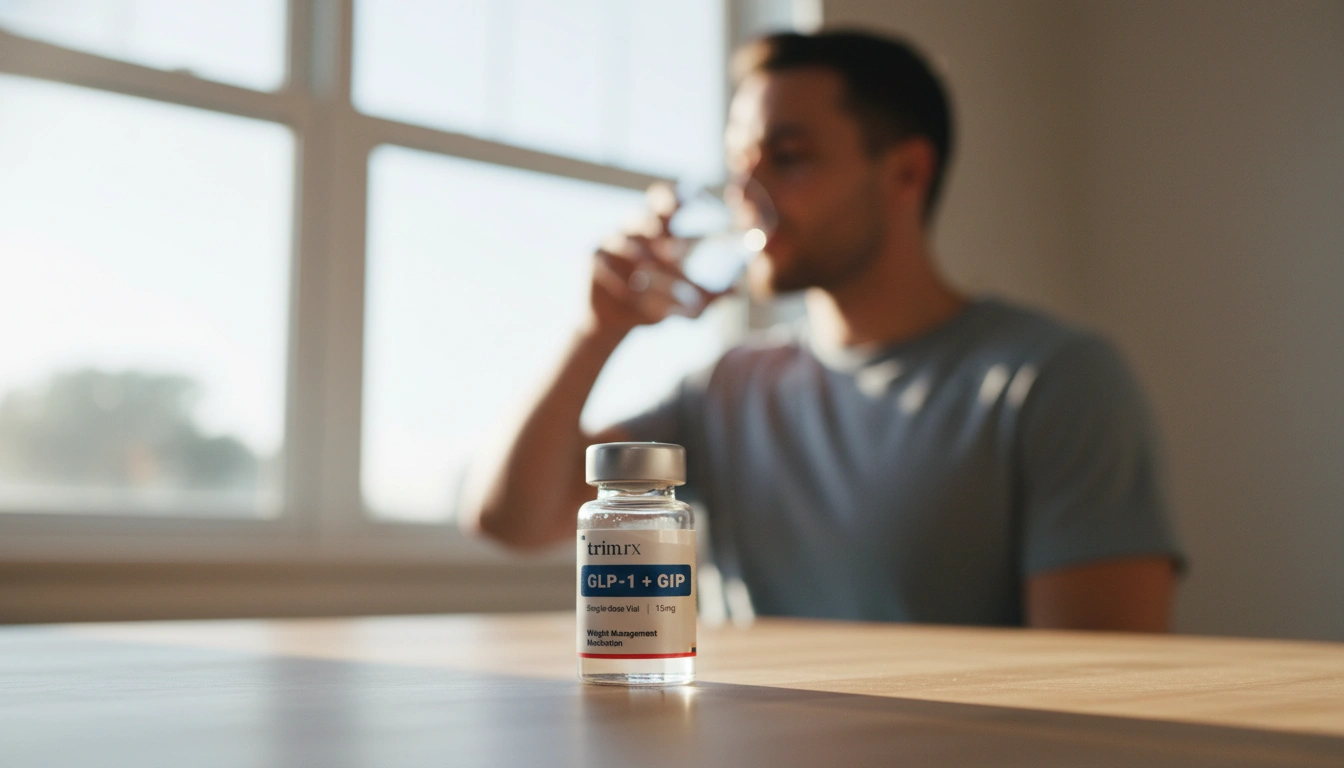How to Stop GLP-1: A Comprehensive Guide

Introduction
Weight management is a complex journey, one that many of us embark on with high hopes and determination. It’s a common scenario: after investing time and effort into a weight loss program, we may find ourselves considering the next step—what happens when we decide to stop using GLP-1 medications? Surprisingly, many individuals who start GLP-1 receptor agonists, such as semaglutide or tirzepatide, do not remain on them long-term. Research shows that a staggering 50-75% of users discontinue their treatment within a year, leading to concerns about weight regain and health implications.
As we dive into this topic, we aim to shed light on the reasons behind this trend, the process of discontinuation, and the measures we can take to maintain a healthier lifestyle post-GLP-1 treatment. At TrimRx, we understand that each weight loss journey is unique. Our commitment to personalized, medically supervised care means we are here to support you every step of the way, ensuring you have the tools necessary for sustainable success.
In this blog post, we will explore the factors influencing the decision to stop GLP-1 medications, the potential consequences of discontinuation, and practical strategies to help you maintain your progress. By the end, you will have a clearer understanding of how to navigate this pivotal moment in your weight loss journey.
Understanding GLP-1 Medications
Before we delve into the specifics of stopping GLP-1 treatments, it’s crucial to understand what these medications are and how they function. GLP-1, or glucagon-like peptide-1, is a hormone that plays a significant role in glucose metabolism and appetite regulation. Medications that mimic GLP-1 can help individuals manage their weight by promoting feelings of fullness, reducing appetite, and enhancing insulin sensitivity.
The Role of GLP-1 in Weight Management
GLP-1 medications, such as semaglutide (Ozempic, Wegovy) and tirzepatide (Mounjaro), have gained popularity not only for their effectiveness in treating type 2 diabetes but also for their significant weight loss benefits. Clinical trials have shown that these medications can lead to an average weight loss of 15-20% over time, making them a powerful tool for managing obesity.
However, the reliance on these medications to maintain weight loss can create a dependency, leading individuals to question how to transition off them once they achieve their goals.
Reasons for Discontinuation
Understanding the reasons why individuals stop using GLP-1 medications can help us address the underlying issues and create strategies for continued success. Here are some common factors influencing this decision:
1. Side Effects
Many people experience side effects when starting GLP-1 medications, including nausea, diarrhea, and vomiting. While these effects often diminish over time, they can be discouraging, leading some individuals to discontinue their treatment prematurely.
2. Cost and Accessibility
The financial burden associated with GLP-1 medications can also be a significant deterrent. High out-of-pocket costs and limited insurance coverage may cause individuals to stop treatment, especially if they feel the benefits are not justifying the expense.
3. Misconceptions About Weight Loss
Some individuals view GLP-1 medications as a quick fix rather than a long-term solution for weight management. This misunderstanding can lead to unrealistic expectations and premature discontinuation once they achieve initial weight loss.
4. Lack of Support
A lack of ongoing support from healthcare providers can impact adherence to medication regimens. Regular check-ins and discussions about progress, side effects, and lifestyle modifications are essential for maintaining motivation and commitment.
5. Psychological Factors
Psychological factors, including stress, anxiety, and emotional eating, can play a significant role in an individual’s relationship with food and weight management. If these issues are not addressed, they may lead to a relapse into old habits once GLP-1 medications are stopped.
The Consequences of Stopping GLP-1 Medications
Deciding to stop GLP-1 medications is not a straightforward choice, and it’s essential to consider the potential consequences of this decision.
1. Weight Regain
Research has consistently shown that weight regain is a common outcome after discontinuing GLP-1 medications. In studies, participants who stopped taking semaglutide regained an average of two-thirds of their lost weight within a year. This rebound effect can be disheartening and may lead to a cycle of weight loss and regain.
2. Changes in Metabolic Health
The discontinuation of GLP-1 medications can also negatively impact metabolic health. Users may experience increased blood sugar levels, higher blood pressure, and a return to pre-treatment levels of cardiometabolic risk factors. This underscores the importance of ongoing medical supervision when considering stopping GLP-1 therapy.
3. Psychological Impact
The emotional toll of weight regain can be significant. Many individuals feel a sense of failure or disappointment after discontinuing their medications and regaining weight. This psychological burden can lead to disillusionment and a reluctance to seek further help or treatment.
A Thoughtful Approach to Discontinuation
If you are considering stopping your GLP-1 medication, it’s crucial to approach the process thoughtfully. Here are some steps to consider:
1. Consult Your Healthcare Provider
Before making any changes to your medication regimen, consult with your healthcare provider. They can help you assess your situation, discuss potential side effects, and create a personalized plan for discontinuation.
2. Gradually Taper Off
Rather than stopping abruptly, consider gradually tapering off the medication. This approach can help minimize withdrawal effects and allow your body to adjust more effectively. Your healthcare provider can guide you on the best tapering schedule.
3. Focus on Lifestyle Modifications
To maintain your weight loss after stopping GLP-1 medications, it’s vital to adopt sustainable lifestyle changes. These may include:
-
Balanced Diet: Focus on nutrient-dense foods, such as fruits, vegetables, whole grains, and lean proteins. Keeping a food log can help you stay accountable and mindful of your portions.
-
Regular Physical Activity: Aim for at least 150 minutes of moderate-intensity exercise each week. This can include activities such as walking, cycling, or swimming, which can help maintain weight and improve overall health.
-
Behavioral Support: Consider seeking support from a weight loss coach or therapist who specializes in behavioral strategies for weight management. This can provide you with valuable tools to cope with emotional eating and develop healthier habits.
4. Monitor Your Progress
Regularly track your weight and other health indicators to stay aware of any changes. This can help you adjust your lifestyle plan as needed and identify any signs of weight regain early on.
5. Stay Connected
Engage with your healthcare provider for ongoing support and check-ins. This continued relationship can provide you with the motivation and accountability necessary for maintaining your weight loss.
FAQ
What should I do if I experience side effects while on GLP-1 medications?
If you experience side effects, it’s essential to communicate with your healthcare provider. They may recommend strategies to manage these effects or adjust your dosage to improve tolerance.
How long should I stay on GLP-1 medications?
The duration of treatment varies for each individual. Your healthcare provider can help determine the appropriate length of time based on your weight loss goals, health status, and response to the medication.
Can I stop taking GLP-1 medications if I’ve reached my goal weight?
While it’s possible to stop taking GLP-1 medications after reaching your goal weight, it’s essential to have a plan in place for maintaining your weight loss through lifestyle modifications. Consulting your healthcare provider is crucial in making this decision.
What are the alternatives to GLP-1 medications for weight management?
Alternatives to GLP-1 medications may include other weight loss medications, bariatric surgery, or lifestyle modifications such as improved diet and exercise routines. Discussing these options with your healthcare provider can help you make informed decisions.
Is it normal to regain weight after stopping GLP-1 medications?
Yes, weight regain is a common occurrence after discontinuing GLP-1 medications. However, implementing sustainable lifestyle changes can help mitigate this effect and maintain your weight loss.
Conclusion
Navigating the decision to stop GLP-1 medications is a significant step in your weight loss journey. At TrimRx, we believe in the power of personalized care and support. By understanding the reasons behind discontinuation, the potential consequences, and the steps to take, we can empower you to maintain your progress and embrace a healthier lifestyle.
As we’ve discussed, a thoughtful approach to discontinuation, combined with ongoing support and lifestyle modifications, can lead to long-term success. Remember, we are here to assist you through every phase of your journey. If you’re interested in exploring personalized weight loss solutions, we invite you to take our free assessment quiz to see if you qualify for our prescription weight loss medications. Together, we can help you achieve your goals and sustain a healthier future.
For those looking for immediate support, consider our quick-access supplements like GLP-1 Daily Support and Weight Loss Boost, designed to complement your weight loss journey effectively.
Let’s continue this conversation about your health and well-being—together, we can navigate your path to success.

Transforming Lives, One Step at a Time
Keep reading
Vitamin B12 and GLP-1 Medications: What to Know
GLP-1 medications can lower B12 absorption and intake; learn symptoms, food sources, supplement options, and how to monitor levels.
Semaglutide Injection Site Reactions: What To Know
Learn why semaglutide injections can cause redness, swelling or nodules, how to prevent and treat them, and when to seek medical care.
TrimRx vs Friday’s
Compare TrimRx and Friday’s telehealth GLP-1 weight-loss programs: pricing, medical support, coaching, delivery, and which fits your needs.



